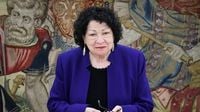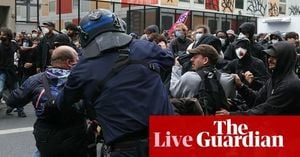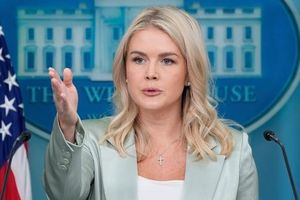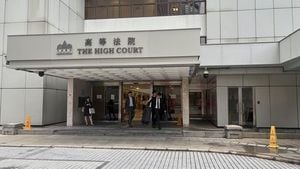The U.S. Supreme Court’s latest immigration ruling has sent shockwaves through California and beyond, igniting fierce debate over civil rights, constitutional protections, and the future of immigration enforcement in America. On September 8, 2025, the Court handed down a 6-3 decision that lifted restrictions on "roving" immigration patrols in Los Angeles, effectively allowing Immigration and Customs Enforcement (ICE) agents to stop and detain individuals based solely on their race, language, or employment. The ruling reversed a lower court order that had previously barred such stops without reasonable suspicion, citing concerns of racial profiling at public places like bus stops and construction sites, according to The Guardian.
The conservative-majority Court’s decision is widely viewed as a significant victory for President Donald Trump, who has repeatedly vowed to conduct record-level deportations of undocumented immigrants if re-elected. The White House quickly welcomed the ruling, doubling down on its commitment to "continue fulfilling its mandate to arrest and deport criminal illegal aliens," as reported by Black Enterprise.
But the backlash was immediate and intense. Justice Sonia Sotomayor, joined by fellow liberal justices Elena Kagan and Ketanji Brown Jackson, issued a scathing dissent. She warned that the ruling greenlights racial profiling and undermines fundamental constitutional protections. "The Government, and now the concurrence, has all but declared that all Latinos, U.S. citizens or not, who work low-wage jobs are fair game to be seized at any time, taken away from work, and held until they provide proof of their legal status to the agents’ satisfaction," Sotomayor wrote in her dissent. She continued, "Countless people in the Los Angeles area have been grabbed, thrown to the ground, and handcuffed simply because of their looks, their accents, and the fact they make a living by doing manual labor. Today, the Court needlessly subjects countless more to these exact same indignities."
Sotomayor’s dissent didn’t stop there. She called out the Court’s lack of explanation for its decision, stating, "The Court’s order is troubling for another reason: It is entirely unexplained. In the last eight months, this Court’s appetite to circumvent the ordinary appellate process and weigh in on important issues has grown exponentially [...] Its interest in explaining itself, unfortunately, has not." She concluded with a stark warning: "The Fourth Amendment may no longer protect the rights of people who happen to look a certain way, speak a certain way, and appear to work a certain type of legitimate job that pays very little. Because this is unconscionably irreconcilable with our Nation’s constitutional guarantees, I dissent."
California officials were quick to add their voices to the chorus of criticism. Governor Gavin Newsom, in a statement on September 9, 2025, condemned the ruling as a "parade of racial terror" targeting Latinos and others, including U.S. citizens and children. "This isn’t about enforcing immigration laws — it’s about targeting Latinos and anyone who doesn’t look or sound like Stephen Miller’s idea of an American, including U.S. citizens and children, to deliberately harm California’s families and small businesses," Newsom said. He added, "Trump’s private police force now has a green light to come after your family — and every person is now a target — but we will continue fighting these abhorrent attacks on Californians."
Los Angeles Mayor Karen Bass echoed these concerns, warning that the ruling threatens personal freedom nationwide and will lead to more families being torn apart. "I want the entire nation to hear me when I say this isn’t just an attack on the people of Los Angeles, this is an attack on every person in every city in this country. Today’s ruling is not only dangerous – it’s un-American and threatens the fabric of personal freedom in the United States of America," Bass wrote. "The highest court in the country ruled that the White House and masked federal agents can racially profile Angelenos with no due process, snatch them off the street with no evidence or warrant, and take them away with no explanation. This decision will lead to more working families being torn apart and fear of the very institutions meant to protect – not persecute – our people."
Immigrant rights advocates and community leaders are also speaking out. Armando Gudino, executive director of the Los Angeles Worker Center Network and a plaintiff in the case, told The Guardian, "Immigration agents are now being given the power to profile, stop, detain, and arrest people because of the color of their skin, the language they speak, or the work that they do. In doing so, they have effectively legalized racial profiling." He described the ruling as an attack on civil rights and warned it would disproportionately affect Latino communities.
Justice Sotomayor has been vocal about the broader implications of such Supreme Court decisions. Appearing on "The View" on September 9, 2025, she warned about "the price we pay" when precedents are overturned or eroded, referencing not only the immigration ruling but also the Dobbs decision that overturned Roe v. Wade. "The price we pay is whatever is happening today, as I indicated, is going to affect a lot of people. But it affects your future. It affects the conduct of leaders in the future, because what we permit today is not going to be duplicated exactly tomorrow. It’s going to be something different," Sotomayor said. "Once we have approved it, it sets a precedent that can be, in your judgment, because in the end you are the people affected, right? Really bad. And that’s what’s at risk, is in each time we change precedent, we are changing the contours of a right that people thought they had. Once you take that away, think of how much more is at risk later. Not just in this situation."
Sotomayor urged Americans to read both majority and dissenting opinions to fully appreciate the complexity of Supreme Court cases. She emphasized, "When you read a majority opinion, it sounds totally convincing. It does. Because for you to sign on to a decision, you have to believe what you are signing on to. Read the dissent. Read the other side, and it will tell you how hard these questions are. Don’t ever think there’s a simple answer. There isn’t." She added, "There’s one side wins, another side, what’s the opposite of win? Loses. The person who loses is losing something they thought was important. A right they had, a claim they thought justified. It is something that’s costing them. This is always a price we pay in court cases."
The ruling has also set the stage for further legal battles. A federal judge is scheduled to hold a hearing later in September 2025 to consider whether additional protections should be reinstated while the case proceeds through the courts, according to Latin Times. Advocates hope the courts may yet impose new limits on ICE operations in Los Angeles and other cities affected by the Supreme Court’s decision.
Justice Sotomayor, nominated by President Barack Obama in 2009, remains one of only three current justices appointed by a Democratic president. Her warnings about the erosion of constitutional rights and the importance of public scrutiny of Supreme Court decisions underscore the gravity of the moment.
As the dust settles on this controversial ruling, the nation finds itself at a crossroads, grappling with questions about the balance between immigration enforcement and civil liberties, the role of the judiciary, and the rights of vulnerable communities. For many, the road ahead looks uncertain—and the stakes, as Justice Sotomayor has cautioned, could not be higher.




